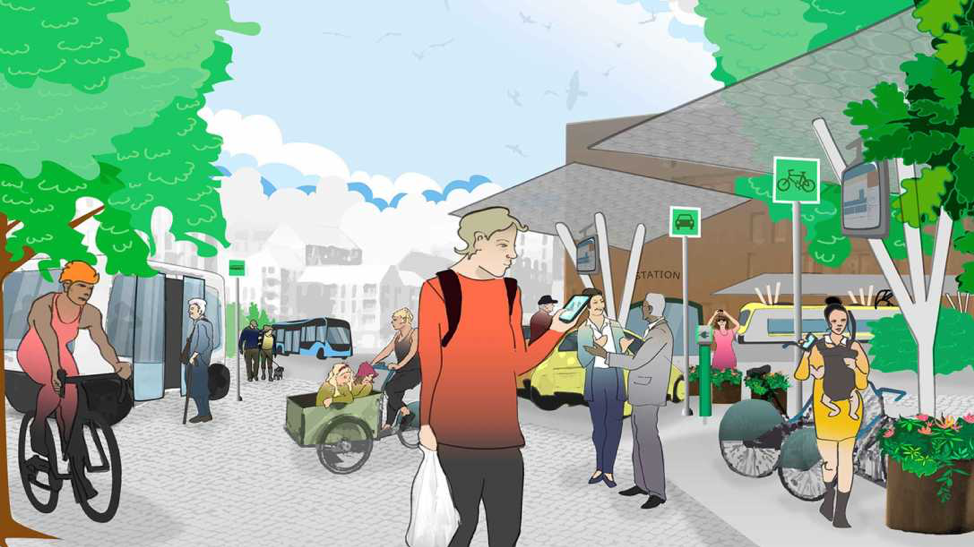KOMPIS - Combined Mobility as a Service in Sweden

The aim of this project is to support the development of combined mobility (CM) in Sweden, by creating favorable conditions and reducing barriers for the development and implementation of CM services that contribute to meeting the Swedish transport policy goals.
KOMPIS, short for Kombinerad Mobilitet Som Tjänst I Sverige is a project initiated by the Government's collaboration group for Next Generation Travel and Transport, and is a project under Drive Sweden , funded by Vinnova . The first period of the project is May 2017 - December 2020, and aims to promote the emergence of combined mobility in Sweden.
Aim
The aim of this project is to support the development of combined mobility (CM) in Sweden, by creating favorable conditions and reducing barriers for the development and implementation of CM services that contribute to meeting the Swedish transport policy goals. The project will coordinate, stimulate and monitor the implementation of four different focused aspects.
Areas of focus:
1. KOMPIS calls
Part of the intention of the KOMPIS project is to promote targeted calls to stimulate the emergence of new mobility services. Various calls for mobility services have been announced to find sustainable mobility solutions.
2. KOMPIS Meetups
KOMPIS aims to stimulate collaboration between all actors in the MaaS ecosystem, making sure that all actors meet and exchange experiences and knowledge, maybe even finding a future business partner through various meetups.
3. Roadmap
The purpose of the roadmap is to support the emergence of combined mobilityby creating favorable conditions and reducing barriers to the development and implementation of CM services that contribute to the Swedish transport policy goals.
In 2018, the roadmap was revised and updated based on what has been achieved in the area and how the outside world has changed. Read here .
4. The Framework
KOMPIS puts an emphasis on developing a framework as well as methods and indicators to evaluate the effects of CM. The goal is applying the framework for the evaluation to take into account both environmental, economic and social aspects from an individual, organizational and social perspective. This framework will be used in CM pilots as an evaluation tool to analyze, evaluate and compare the effects of new mobility services on mobility patterns, as well as their effect on a community level.
ITRL's role in the work package related to the framework:
An important part of the KOMPIS program, ITRL is taking a leading role in the framework work package. The goal is to evaluate if, and to what extent, combined mobility contributes to environmental, economic and social sustainability. In order to enable such a valuation, a framework is being designed using relevant indicators
Planned approach and implementation of KOMPIS
The project will be conducted with a coordinating and stimulating focus. Coordination refers to different initiatives within combined mobility and MaaS in Sweden, initiated by both public, but also private actors.
A tool in this will be the collaboration platform, which aims at synergy, transparency and dissemination of activities and results in the area. The project will also be able to stimulate significant activities in the roadmap through calls under Drive Sweden.
Expected results and effects of KOMPIS
- Coordinate, develop and manage the Combined Mobility Roadmap as a service
- Identify and conduct pilots in the policy and regulatory area in several regions, of which at least one metropolitan region, public transport has been made available in a coordinated and adapted manner; this includes digital tickets and services for 3:rd party sales, which enables the development of CM services
- Support for pilots and upscaling of mobility services. At least three CM services are running at levels 2 and 3 i.e. resale and packaging of transport services as integrated solutions, and to prepare for level 4, where policy and control instruments are also integrated in the service offering
- Support for public transport for digitizing the ticket offerings. Investigations have been started into how changed policies such as mobility services and new types of ticket-product may be beneficial
- A framework for evaluating effects of CM services, especially from the perspective of community benefit, will be developed and applied.
- Collaboration for the whole MaaS ecosystem. Support, information and dissemination of knowledge about MaaS and Combined Mobility
Project Partner

Funding Partner

Publications

